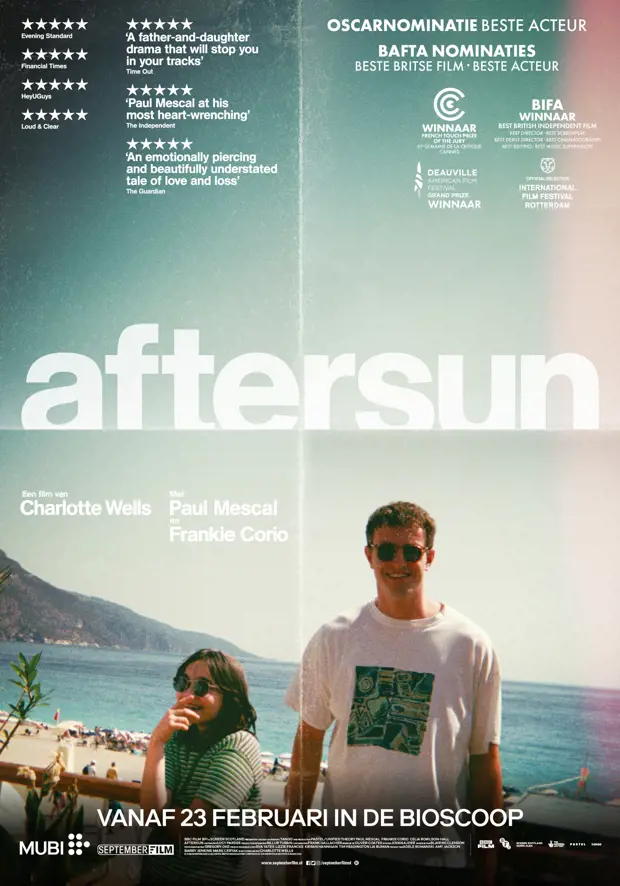

Sometimes we look back on our experiences with those near and dear to us, and ask ourselves how we could have possibly missed the signs. We ruminate and go over everything in our heads again and again. Aftersun is about our search for clues in past memories. The film paints a bittersweet picture of parenthood after divorce, in which we accompany Sophie (11) and her dad Calum on holiday in Turkey together.
Some scenes are shot from their perspective, through the lens of a camcorder, and throughout the film we catch glimpses of Sophie watching these scenes back as an adult, as if she were analysing them, trying to read between the lines of what seems to be a relatively normal childhood memory. In doing so, she attempts to reconcile the father she knew with the man she didn’t. Watching it for the second time in the cinema (yes, it left its mark), I also found myself searching for clues that could help me better understand the story.
During their time together, we see Calum try to be a good father. It’s in these moments that we start to see the cracks in his calm exterior, laying bare an individual weighed down by his own emotional turbulence. A pair of lost goggles send him spiraling. We see him dwell on things that Sophie ultimately doesn’t care about. In one scene he half-heartedly offers to pay for singing lessons for her, even though they both know he can’t afford it. In some ways, his emotional state makes it difficult for him to come through in the aspects that may mean more to her, like simply being present.
What’s interesting is that the film’s premise implies Sophie might not have been aware of Calum’s struggles at the time. And yet, the way her character navigates his, at times odd, behaviour suggests otherwise and is what makes this story such a moving one. While still a child that may not fully understand the complexity of the situation, rather than act out, or make him feel bad for how he responds to situations, she tries to divert attention away from the heaviness with shenanigans and silliness, revealing her deep care for him.
‘I think it’s nice that we share the same sky’
In general, the rapport between the two is a pleasure to watch as they successfully transmit this unique father-daughter bond in such a natural way. You’d almost think you’re witnessing two real life individuals interacting, rather than two actors starring in a movie. But, the true beauty of this film lies in its subtlety and unspoken moments, the way nothing seems rushed or forced — you don’t feel like some deep underlying message is being shoved down your throat. Instead, like Sophie (who is emotionally intelligent beyond her years), you pick up on the little details in your quiet, consistent observation of them.
Like with most slice of life movies, if you go in expecting the classic build-up and climax trajectory, followed by some sort of nicely wrapped up conclusion, you’ll probably be disappointed. Instead, the director bends the rules, allowing emotions to take centre stage and form the storytelling here. The oddly aesthetic combination of scrappy DV-cam footage and normally filmed scenes, the vibrant colour grading, and the talented performances are only additional bonuses to an otherwise compelling film that drives one message home, namely that – ultimately – loss is universal.
Aftersun has received multiple award nominations and is the Winner of a BAFTA for Outstanding Debut by a British Writer, Director, or Producer.
Written and directed by: Charlotte Wells
Aftersun is currently available in cinemas.

Sometimes we look back on our experiences with those near and dear to us, and ask ourselves how we could have possibly missed the signs. We ruminate and go over everything in our heads again and again. Aftersun is about our search for clues in past memories. The film paints a bittersweet picture of parenthood after divorce, in which we accompany Sophie (11) and her dad Calum on holiday in Turkey together.
Some scenes are shot from their perspective, through the lens of a camcorder, and throughout the film we catch glimpses of Sophie watching these scenes back as an adult, as if she were analysing them, trying to read between the lines of what seems to be a relatively normal childhood memory. In doing so, she attempts to reconcile the father she knew with the man she didn’t. Watching it for the second time in the cinema (yes, it left its mark), I also found myself searching for clues that could help me better understand the story.
During their time together, we see Calum try to be a good father. It’s in these moments that we start to see the cracks in his calm exterior, laying bare an individual weighed down by his own emotional turbulence. A pair of lost goggles send him spiraling. We see him dwell on things that Sophie ultimately doesn’t care about. In one scene he half-heartedly offers to pay for singing lessons for her, even though they both know he can’t afford it. In some ways, his emotional state makes it difficult for him to come through in the aspects that may mean more to her, like simply being present.
What’s interesting is that the film’s premise implies Sophie might not have been aware of Calum’s struggles at the time. And yet, the way her character navigates his, at times odd, behaviour suggests otherwise and is what makes this story such a moving one. While still a child that may not fully understand the complexity of the situation, rather than act out, or make him feel bad for how he responds to situations, she tries to divert attention away from the heaviness with shenanigans and silliness, revealing her deep care for him.
‘I think it’s nice that we share the same sky’
In general, the rapport between the two is a pleasure to watch as they successfully transmit this unique father-daughter bond in such a natural way. You’d almost think you’re witnessing two real life individuals interacting, rather than two actors starring in a movie. But, the true beauty of this film lies in its subtlety and unspoken moments, the way nothing seems rushed or forced — you don’t feel like some deep underlying message is being shoved down your throat. Instead, like Sophie (who is emotionally intelligent beyond her years), you pick up on the little details in your quiet, consistent observation of them.
Like with most slice of life movies, if you go in expecting the classic build-up and climax trajectory, followed by some sort of nicely wrapped up conclusion, you’ll probably be disappointed. Instead, the director bends the rules, allowing emotions to take centre stage and form the storytelling here. The oddly aesthetic combination of scrappy DV-cam footage and normally filmed scenes, the vibrant colour grading, and the talented performances are only additional bonuses to an otherwise compelling film that drives one message home, namely that – ultimately – loss is universal.
Aftersun has received multiple award nominations and is the Winner of a BAFTA for Outstanding Debut by a British Writer, Director, or Producer.
Written and directed by: Charlotte Wells
Aftersun is currently available in cinemas.



